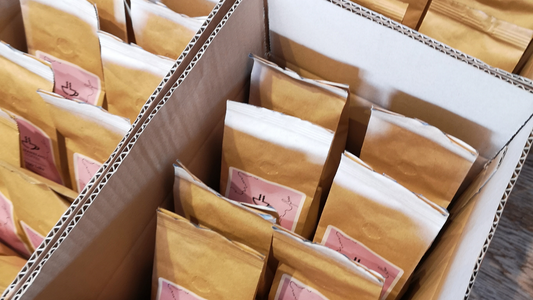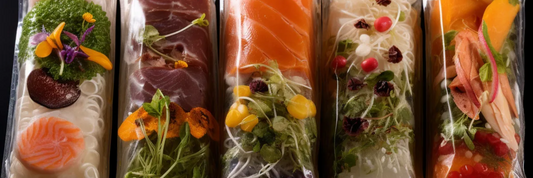Clamshell containers is a popular type of food packaging. They can be made from different materials and have various applications. But what are clamshell containers exactly? Can they be used with your food? Explore in our today article.
- Plastic Clamshells Vs Styrofoam Containers: Which Should to Use?
- What Are Advantages of Sugarcane Clamshell Containers?
What Are Clamshell Containers?
Clamshell container is a type of packaging that can be made from disposable and reusable materials. They are characterized by their one-piece design, featuring two hinged halves that mimic the opening and closing of a clam shell. This hinge allows for secure closure and easy access to contents.
This combination of functionality and adaptability makes clamshell containers a popular choice for a variety of applications, including:
- Food packaging: Transporting salads, pastries, and other takeout items.
- Electronics: Protecting delicate components during transport and storage.
- Hardware: Housing fasteners, tools, and other small parts.
- Jewelry and accessories: Displaying and protecting earrings, necklaces, and other items.
In this article, we will discuss on clamshell packaging types for food packaging.

Types of Clamshell Packaging Containers for Food Packaging
Clamshell containers are various by size, shapes and materials. They are explained as below.
Categorized by Size
Clamshell containers offer a remarkable range of sizes, catering to a variety of portion controls and product presentations.
- Small: Ideal for condiments, dips, or single-serving snacks, these containers minimize material usage while maintaining product integrity.
- Medium: A popular choice for sandwiches, pastries, or individual fruit servings, this size offers a practical balance between utility and portion control.
- Large: Well-suited for whole salads, large bakery items, or family-sized meals, larger clamshells provide ample space for presentation and consumption.
Categorized by Shapes
Beyond the classic rectangular clamshell, innovative shapes can elevate both product presentation and functionality:
- Round: Evoking a sense of naturalness, round clamshells are ideal for salads, fruits, or desserts, allowing for 360-degree product visibility.
- Square: Offering clean lines and a stable presentation, square containers are perfect for showcasing bakery items, cookies, or stacked sandwiches.
- Oval: An eye-catching option for sandwiches, wraps, or prepared meals, oval clamshells can add a touch of distinction while maintaining practicality.
Categorized by Materials
Plastic Clamshell Packaging
Plastic clamshell containers are widely used and often recyclable (depending on the specific plastic type), plastic clamshells offer excellent clarity and effective barrier protection for packaged foods. This allows consumers to see the product and helps prevent spoilage by limiting exposure to air, moisture, and contaminants. Common plastic types include:
- PET (Polyethylene Terephthalate): Renowned for its clarity and barrier properties, making it ideal for showcasing fresh produce, baked goods, or prepared salads.
- PP (Polypropylene): Known for its durability and heat resistance, well-suited for packaging hot food items like ready-to-eat meals or takeout containers.
- PVC (Polyvinyl Chloride): Less common due to environmental concerns and potential health risks, PVC was previously used for its exceptional clarity and rigidity. However, many companies are phasing it out in favor of more sustainable options.

Thermoform Clamshell Packaging
Thermoforming is the dominant manufacturing process used to create clamshell containers from various materials, including the plastics mentioned above. It's important to distinguish thermoforming as a process rather than a separate material category.
Thermoforming utilizes heat and pressure to mold plastic sheets into the clamshell shape, ensuring consistency, efficiency, and high-volume production of these containers.
Paperboard Clamshell Packaging
Constructed from recycled paper pulp, paperboard clamshells offer an eco-friendly and biodegradable option, ideal for dry food items like cookies, sandwiches, or short-term use for salads.
They are a sustainable alternative for companies seeking to reduce their environmental footprint and cater to eco-conscious consumers. However, paperboard clamshells may not be suitable for greasy or moist foods due to potential for absorbing moisture and losing integrity.

Plant-fiber Clamshell Packaging
Derived from plant-based materials like sugarcane or bamboo, plant-fiber clamshells provide a compostable alternative to traditional plastic options. This sustainable option is gaining traction as consumers and businesses prioritize environmentally responsible packaging solutions.
Plant-fiber clamshells can be suitable for a wider range of food items compared to paperboard due to some level of moisture resistance. However, they may not offer the same level of clarity or barrier protection as some plastics.
Related: Guide to Sugarcane Fiber Packaging
Styrofoam Clamshell Packaging
While Styrofoam (expanded polystyrene) offers benefits like being lightweight and insulating, its limited recyclability raises environmental concerns. Additionally, Styrofoam is not recommended for packaging hot food items due to the potential for chemical leaching into food contents, posing potential health risks.
What Food Packaging Applications Are Clamshells Used for?
With the ability to securely contain, protect, and clearly showcase a wide variety of food items, clamshell containers are a popular choice across numerous applications. Here are some of the most common food packaging uses for clamshell containers:
Fresh Produce:
- Salads: Clamshells with good ventilation are ideal for pre-packaged salads, allowing customers to visually assess freshness while maintaining crispness.
- Fruits and vegetables: From cherry tomatoes to sliced peppers, clamshells provide a convenient and protective way to package loose produce items.
Bakery and Desserts:
- Pastries and baked goods: Clamshells safeguard pastries, cookies, and muffins during transport and display, while also offering clarity to entice customers.
- Cakes and Slices: Certain clamshell containers can accommodate larger bakery items like slices of cake, protecting delicate frosting and decorations.
Ready-to-Eat Meals and Takeout:
- Sandwiches and wraps: Clamshells provide a secure and portable way to package sandwiches and wraps, keeping them fresh and preventing ingredients from spilling.
- Salads and Prepared Entrees: Larger clamshells are suitable for pre-made salads or complete meals, offering a convenient grab-and-go option for consumers.
Other Food Applications:
- Cheese and deli slices: Clamshells offer a hygienic and visually appealing way to display and package sliced meats and cheeses at delis or supermarkets.
- Dips and condiments: Small clamshells are perfect for portion-controlled packaging of dips, condiments, or single-serving snacks like nuts or dried fruit.

What Are the Advantages and Disadvantages of Clamshell Containers?
Clamshell containers come with both advantages and disadvantages to consider:
Advantages of clamshell packaging:
- Protection: Clamshell containers provide a secure barrier against dust, dirt, and physical damage, safeguarding food during transport, storage, and display.
- Visibility: Transparent plastic clamshells allow customers to see the product within, influencing purchasing decisions and promoting freshness.
- Portability: Their lightweight and stackable design makes them convenient for grab-and-go meals or easy transport by consumers.
- Reseal ability: Many clamshells feature a hinged lid that allows for reclosing, promoting portion control and preventing spoilage of leftover food.
- Versatility: Available in a wide range of shapes, sizes, and materials, clamshells can accommodate various food items and portion sizes.
Disadvantages of clamshell containers:
- Environmental impact: Traditional plastic clamshells can be slow to degrade and contribute to plastic pollution if not disposed of responsibly.
- Limited breathability: Certain clamshells may not allow for adequate air circulation, leading to moisture buildup and potentially affecting the freshness of some foods.
- Heat Resistance: Not all clamshell materials are heat-resistant. Using them for hot foods could lead to warping or melting, potentially compromising food safety.
- Cost: Depending on the material and features, clamshell containers can be more expensive compared to some alternative packaging options.
Overall. clamshell containers offer undeniable convenience and functionality for food packaging. However, when choosing the clamshell containers for your business, there are some more considerations that your need to know.
Choosing the Right Clamshell Containers for Your Business
Clamshell containers have a wide range of applications, but with such a variety of sizes, shapes, and materials, which one is the right choice for your business? When purchasing clamshell containers, in addition to factors such as suitability for the type of food, food safety, and price, don't forget to consider environmental friendliness, especially in the context of growing consumer awareness of environmental issues. Therefore, choosing clamshell containers made from paper or plant-fiber materials like sugarcane is a more suitable choice.
At Kimecopak, we offer clamshell containers made from sugarcane that are food-safe, suitable for a variety of foods, and fully compostable. This helps businesses solve their product packaging needs in a sustainable manner. We also support businesses in their operations with our Subscribe for Happy Life program, which offers a range of attractive benefits, including:
- Fixed price for 6 months
- Instant savings of 5-7%
- Free storage
- Scheduled Delivery
For more information, please contact us via email at halo@kimecopak.ca or visit our Kimecopak Facebook Fanpage.
Conclusion
Clamshell containers offer convenient food packaging, but their environmental impact is a growing concern. Sustainable options like paperboard or plant-fiber clamshells minimize environmental footprint and cater to eco-conscious consumers. Businesses can prioritize both functionality and sustainability for optimal packaging choices.









